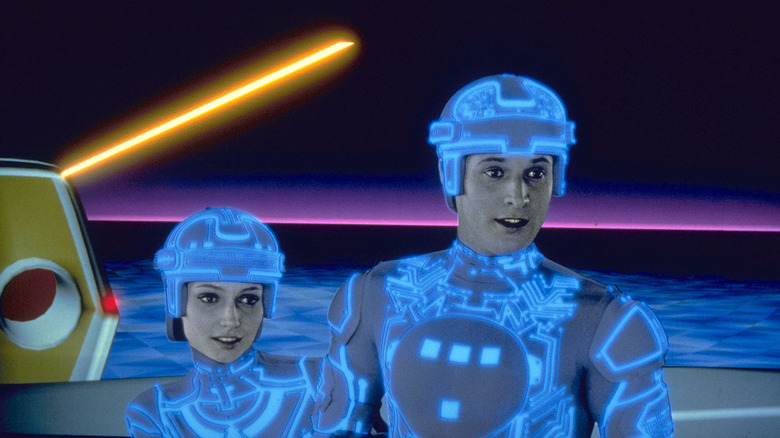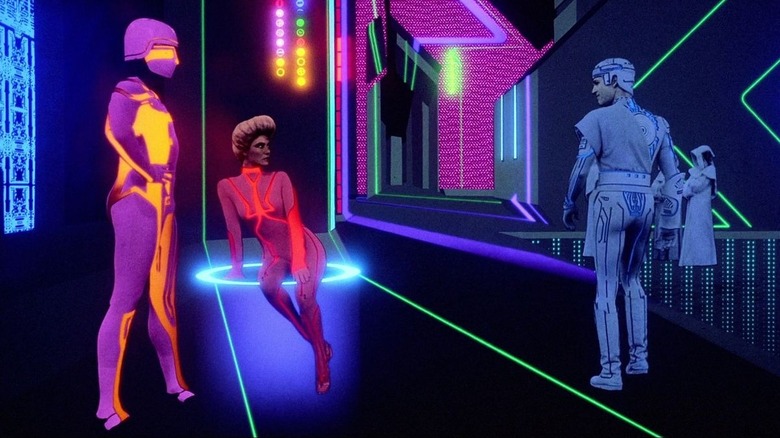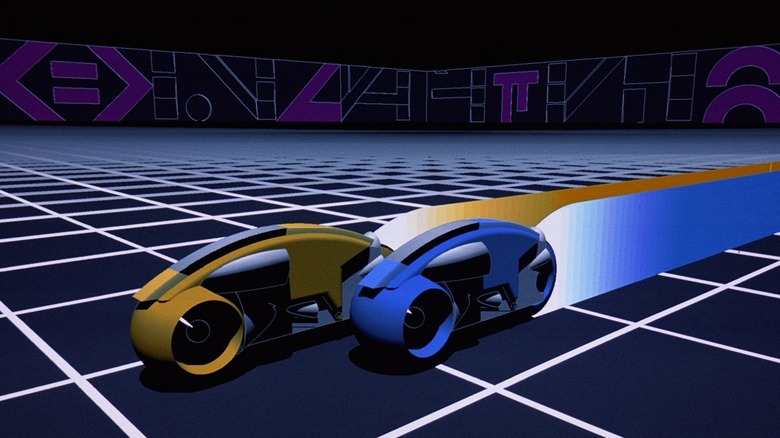It's 2025 And I Just Watched 1982's Tron For The First Time – These Are My Honest Thoughts
I may be biased when I say this because I grew up in the 1980s, but it truly was the best decade in history to be a kid. There were just so many exciting new movies, toys, and video games to capture the imagination, but despite loving all three, I somehow managed to miss "Tron" at the time. I definitely knew it existed; I remember distinctly the VHS box at my local corner shop video store and playing the very cool "Tron" stand-up cabinet in video arcades. I also assimilated the film's iconic neon-lit imagery by cultural osmosis over the years, but I never got around to actually watching the movie itself. So, ahead of the release of Disney's "Tron: Ares," I sat down to correct that oversight for the first time in 2025.
"Tron" was a groundbreaking experiment from Disney, one of the first feature-length films to use a whole ton of computer-generated imagery. Its creator, Steve Lisberger, was inspired by his first encounter with the "Pong" video game back in the '70s, and, armed with a sizeable budget of $17 million (more than "E.T. the Extra-Terrestrial" and "Star Trek II" from the same year) leaned hard into the video arcade aesthetic, blending CGI with good old-fashioned cinematic sleight-of-hand to create a fully realized computer world for the characters to run around in.
"Tron" was lauded as a technical marvel but failed to live up to expectations at the box office and also got snubbed for Best Visual Effects at the Oscars — according to Lisberger, the Academy felt that the use of computers was cheating a little. Nevertheless, it must have been mind-blowing to watch in the cinema for the first time and it has built a strong cult following over the decades. Here are my thoughts after watching at home on my sofa.
What happens in Tron?
"Tron" starts in such disorienting fashion that I thought I'd accidentally skipped forward; Steve Lisberger was clearly so eager to show off his new toys that it feels like it starts in the middle of the movie. After a brief glimpse of the real world, we're dropped straight into a dazzling computer kingdom where an evil henchman named SARK (David Warner) delights in destroying unwanted programs by playing gladiatorial video games with them.
Thankfully, the movie calms down a bit and sets out the story. Flynn is a brilliant computer programmer who was given the chop by his employer, ENCOM, and now runs the coolest video arcade on the planet. He once coded a bunch of hit video games only for his rival Ed Dillinger (Warner again) to steal the credit, and Flynn enlists the help of his former colleagues Alan Bradley (Bruce Boxleitner) and Lora Baines (Cindy Morgan) to gain access to an ENCOM terminal and uncover the truth.
Meanwhile, Dillinger has programmed ENCOM's Master Control Program (MCP), which has become sentient and is growing exponentially more intelligent. Not only is the malevolent mainframe hellbent on wiping out any rebellious programs and hackers, it also wants to access the Pentagon and the Kremlin because it thinks it can run things better than us puny-minded humans. Naturally, Flynn gets zapped into the digital world and must survive long enough to bring down SARK and the MCP core unit. The jargon-filled plot of "Tron" was met with some bemusement at the time, but it's pretty easy to understand from a modern perspective. It's a little like "The Matrix" but the roles are reversed; Flynn helped create the virtual world while its denizens think of Users like himself as pseudo-religious deities.
How does Tron hold up today?
Like many people, I've reached a point of CGI saturation. It's all so generic nowadays and it almost never helps me suspend disbelief; it usually ends up taking me out of the movie instead. "Tron" is truly remarkable in that respect. The effects may be primitive by today's standards but they are clean, bold, and distinctive, and, combined with the ingenious practical stuff, creates a borderline trippy effect that completely absorbed me in its neon glow. I kept thinking of Marlene Dietrich's line from Orson Welles' "Touch of Evil" — as a newcomer to the film, it felt "so old, it's new," and it was the first time in ages that I've been completely wowed by a movie's SFX.
Sadly, Steven Lisberger and his co-storywriter Bonnie MacBird failed to deliver a compelling plot or interesting characters to match the astonishing visuals. Ironically for a movie inspired by old-school video games, the people are the most two-dimensional thing about "Tron." It also lacks any real stakes. When I heard the bit about the MCP trying to hack the Pentagon, I was expecting a scenario like in "Wargames" where nuclear annihilation is imminent unless Flynn and his friends prevail, but it hardly gets mentioned again.
That would've been a great opportunity to add a thrilling ticking clock element, but instead we just get our heroes running around an abstract grid-like landscape pursued by CG tanks and "Space Invaders"-style flying ships. Which is a shame, because the film was very prescient about technological issues we face today: Sinister big tech, virtual worlds, and potentially harmful AI. Ultimately, "Tron" gets pretty tedious after the novelty of the environment has worn off, but it's still an amazing feast for the eyes. As someone who grew up with that retro '80s look, it made me feel like a kid again.


